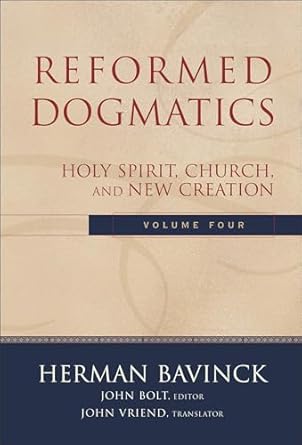A Brief Book Summary from Books At a Glance
by Steve West
Table of Contents
Part I: The Spirit Gives New Life to Believers
1. Calling and Regeneration
2. Conversion
3. Justification
4. Sanctification and Perseverance
Part II: The Spirit Creates New Community
5. The Church’s Spiritual Essence
6. The Church’s Spiritual Government
7. The Church’s Spiritual Power
8. The Spirit’s Means of Grace: Proclamation
9. The Spirit’s Means of Grace: The Sacraments
10. The Spirit’s Means of Grace: Baptism
11. The Spirit’s Means of Grace: The Lord’s Supper
Part III: The Spirit Makes All Things New
A. The Intermediate State
12. The Question of Immortality
13. After Death, Then What?
14. Between Death and Resurrection
B. The Return of Christ
15. Visions of the End
16. Israel, the Millennium, and Christ’s Return
C. The Consummation
17. The Day of the Lord
18. The Renewal of Creation
Summary
*Editor’s Note: This book is divided into two book summaries. The first summarizes Part I & Part II (Chapters 5 & 6), and the second summarizes Part II (Chapters 7-11) and Part III.
Part II: The Spirit Creates Community (Chapters 7-11)
Before sin entered the world, the basic unit of community was the family. Today, the state and the church also exist, and there are spheres in social organization. The nation of Israel had different domains, all of which were under the theocratic rule of God. After Israel’s exile, the familial and religious spheres became more independent from the civil. The gospel honors God-given authorities and opposes wickedness. Social reforms through the gospel begin with transformed lives and sanctification. The church’s power in witness was tied to its proclamation of truth and the peaceable, godly lives of its members. With its small origins, no one could imagine it holding power over states. Compromise occurred as the church arrogated to itself secular power, which happened most egregiously in the West with Roman Catholicism. Church officers only have authority by virtue of their submission to Christ and the word of the gospel. Church and state are distinct, but the church is to share truth and spiritual blessings in every sphere of society. Likewise, the state is to rule according to God’s truth and moral standards.
There are debates about the exact form that the church’s structure should take. It is sinful, however, for the church to change its power to political power; it is also wrong for the state to exercise ecclesiastical power. The church’s power is spiritual: it is not civil power, and it does not have the right to engage in civil punishments. Reformation ecclesiology saw the church’s power as being purely spiritual, coming through the Word, sacraments, and proper church discipline. The church exercised authority in the ministry of prophet (proclamation of truth), priest (mercy ministry), and king (proper church governing). Teaching is not reducible to intellectual content, and it must edify the entire congregation. Correction and church discipline is sometimes required, but this must be done with the right attitude and with the goal of restoration. Excommunication is always a move of last resort, and the desire is still for repentance and reconciliation. It is Christ himself who rules and ministers to the church through its offices and ministers. Synods and councils have not been perfect, but they do have an important function. In the end, all authority in the church or assemblies can only come through Christ.
Christ is the only mediator between God and man, but he instituted ministers for the ministry of proclaiming the Word. The Reformers turned from Rome’s position on grace and sacraments, looking to the spiritual power of the Word instead of the authority of the church and the sacerdotal system. God’s Word and the proper administration of the sacraments are the ordinary means of grace. Although the means of grace are administered in the church, it is only by Christ that they are effective. God’s Word as Scripture is different from “the word of God,” since the latter can represent to us God’s truth in various ways (parental instruction, sermons, etc.). Scripture is relevant to everyone (since it contains both law and gospel). Christ fulfills the law, and in his death we are freed from the law’s curse. Now by the power of the Spirit we can delight in God’s law and live for him. Both antinomianism and nomism fail to uphold the biblical tension and antithesis of law and gospel. . . .
[To continue reading this summary, please see below....]The remainder of this article is premium content. Become a member to continue reading.
Already have an account? Sign In
